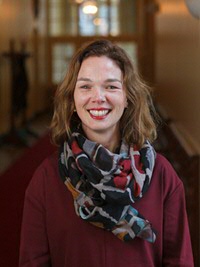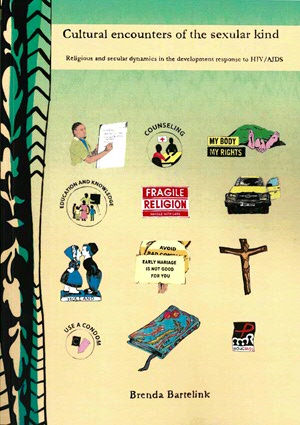Cultural encounters of the sexular kind
On 24 March 2016, Brenda Bartelink will be awarded a PhD for her work on the conflicts between religious and secular approaches to HIV/AIDS in the development organization network Educaids. Educaids is a network of Christian development organizations from the Netherlands and Uganda, which work together to promote sexual education and the prevention of HIV and AIDS in Uganda. The network specifically targets the Ugandan education system. PhD student Brenda Bartelink conducted ethnographic research into Educaids from 2006 to 2010, to examine the dynamics of religious and secular approaches to HIV/AIDS within this partnership network. Brenda will defend her thesis in the Aula of the University of Groningen at 2.30 p.m. on 24 March.

Enforced secular-liberal approach
She concludes that despite the fact that the organizations share a Christian identity, the religious and moral dilemmas around sexuality and sex education for young people only receive marginal attention in the Educaids programme (which is currently no longer active in U ganda) . Secularization has led to a liberal approach to sexuality dominating in Dutch society, and so a secular–liberal approach to sexuality has been introduced to the Ugandan organizations in the network.
Major changes
Brenda Bartelink: ‘For the past five decades, increasing secularization and professionalization has caused major changes to Christian development organizations in the Netherlands. Access to economic capital through government subsidies has been an important incentive for working closely with the Dutch government. In the 1960s and 70s, religion was still the ideological motive for taking social responsibility. But since the turn of this century, religion has been “reduced” to a promotional feature of organizational identity. The secular–liberal approach to sexuality has become dominant in the policy and programmes of the Educaids network, and U gandan organizations wanting access to Dutch economic capital have little choice but to adopt a pragmatic stance on the views of the Dutch organizations.’

Conflicting opinions
As a result, a cultural conflict has evolved within Educaids, and ideas on religion, sexuality and secularism have taken different sides. The secular evidence-based approach is at odds with what is seen as a conservative religious, moral values-based approach. It is important to understand that conflicting opinions about HIV/AIDS are not only the result of Ugandan organizations defending conservative religious morals, but also of opposition to unilaterally enforced secular morality. According to Bartelink, the resistance to homosexuality or the use of condoms expressed by Ugandan organizations must be seen in the context of a cultural encounter between organizations that draw on very different sources of power: moral and economic power.
Sources of power
Bartelink identifies various types of inequality in the conflict between the Dutch and Ugandan organizations in the Educaids network. However, Ugandan organizations have sources of power at their disposal, in the same way as the Dutch organizations. Dutch organizations are in a better position to secure or affirm their Christian identity through their relations with Christian organizations in Uganda. In turn, this gives Ugandan organizations leverage to use their influence on the partnership by, for example, rejecting certain elements of sex education considered important by the Dutch organizations. Bartelink also sees opportunities for Christian development organizations in the Netherlands to find room for alternative means of encouraging dialogue on sexuality, despite the pressures (economic or otherwise) of secularization and the associated secular–liberal approach to sexuality. ‘My research has made me even more convinced of the complexity of the cultural dynamics within which religion and secularism are meaningful in practice.’
PhD ceremony
Brenda will defend her thesis on 24 March in the presence of her supervisor Prof. Kocku von Stuckrad, Professor of Religious Studies at the Faculty of Theology and Religious Studies of the University of Groningen.
| Last modified: | 09 August 2024 12.10 p.m. |
More news
-
05 March 2025
Women in Science
The UG celebrates International Women’s Day with a special photo series: Women in Science.
-
10 February 2025
Project GRACE: An ENLIGHT ETN Grant Winner
We are happy to announce that the project GRACE, with Julia Martínez-Ariño as the main coordinator, is one of the projects selected for the ENLIGHT 2024 Call. Congratulations to the GRACE team.
